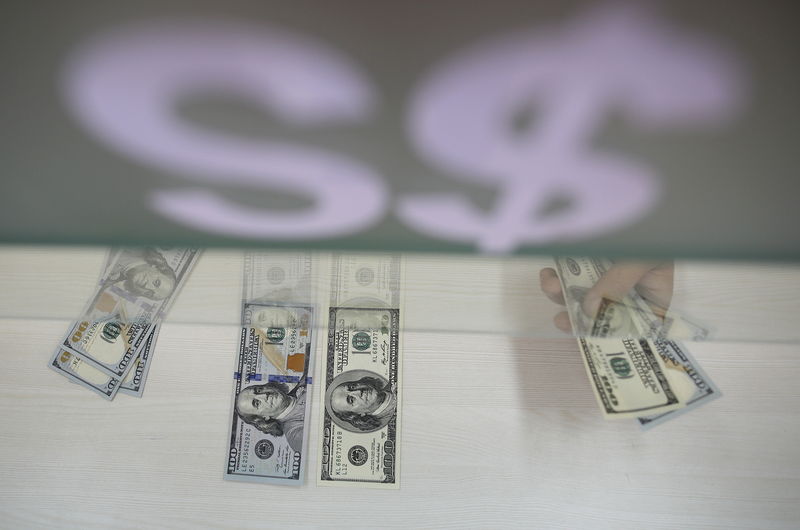* Thai baht set for worst week since early March
* All eyes on China June trade data, widely seen to fall
* Dismal Singapore Q2 growth stokes recession fears
(Adds text, updates prices)
By Devika Syamnath
July 12 (Reuters) - Most Asian currencies weakened on Friday
as renewed doubts about the chances of a Sino-U.S. trade deal
dampened appetite for riskier assets.
Investors were also anxiously waiting on trade data for June
from China later in the day, which is expected to show weak
exports in yet another sign of the broadening economic impact of
the trade war. The Thai baht THB=TH weakened sharply after its central
bank clamped down on speculative foreign inflows to temper rapid
gains in Asia's best performing currency this year. The currency was 0.8% lower on the day and set for its worst
week since early March.
China's yuan CNY=CFXS was broadly unchanged ahead of the
June trade data. Overall, currency traders in the region were
uneasy after U.S. President Donald Trump said on Thursday that
"China is letting us down" on promises it made on buying
agricultural products from American farmers. The South Korea won KRW=KFTC was also under pressure, down
0.4%, as a trade row between Seoul and Tokyo showed no signs of
being resolved. South Korea on Thursday warned https://www.reuters.com/article/us-southkorea-japan-laborers/south-korea-steps-up-effort-to-get-us-help-in-export-row-with-japan-idUSKCN1U6019
the U.S. of potential fallout from "undesirable" Japanese
restrictions on exports of high-tech material to South Korea.
Monetary policy was another consideration for the regional
markets, as analysts suggested most Southeast Asian economies
were poised to jump on the policy easing bandwagon after the
U.S. Federal Reserve offered clear signs of a near-term rate cut
earlier this week.
"Central banks in Korea and Indonesia are likely to be next
in line to ease policy," said ING in a note to clients.
"Korea's growth is poised for more weakness ahead from
export declines," it added. South Korea's trade-reliant economy
is among the most affected by trade and tech war pressures.
DISMAL SINGAPORE DATA RAISES RECESSION FEARS
Singapore's dollar SGD= was 0.1% lower after dismal second
quarter growth data that missed forecasts by a wide margin.
The economy grew at its slowest pace in a decade in the
second quarter, raising bets that a recession and monetary
policy easing were on the horizon. The city state's export-driven economy leaves it
particularly exposed to trade war ructions.
"The Singapore dollar has looked more wobbly with
chat mounting of an out of meeting policy adjustment from the
central bank – we wouldn't be surprised - and some regional
underperformance here is not to be dismissed," said ING in a
note.
The following table shows rates for Asian currencies against
the dollar at 0519 GMT.
CURRENCIES VS U.S. DOLLAR
Currency Latest bid Previous day Pct Move
Japan yen 108.320 108.48 +0.15
Sing dlr 1.358 1.3568 -0.05
Taiwan dlr 31.030 31.026 -0.01
Korean won 1177.600 1173.5 -0.35
Baht 30.870 30.61 -0.84
Peso 51.180 51.19 +0.02
Rupiah 14075.000 14060 -0.11
Rupee 68.535 68.44 -0.14
Ringgit 4.111 4.114 +0.07
Yuan 6.872 6.8740 +0.03
Change so far in 2019
Currency Latest bid End 2018 Pct Move
Japan yen 108.320 109.56 +1.14
Sing dlr 1.358 1.3627 +0.38
Taiwan dlr 31.030 30.733 -0.96
Korean won 1177.600 1115.70 -5.26
Baht 30.870 32.55 +5.44
Peso 51.180 52.47 +2.52
Rupiah 14075.000 14375 +2.13
Rupee 68.535 69.77 +1.80
Ringgit 4.111 4.1300 +0.46
Yuan 6.872 6.8730 +0.02
